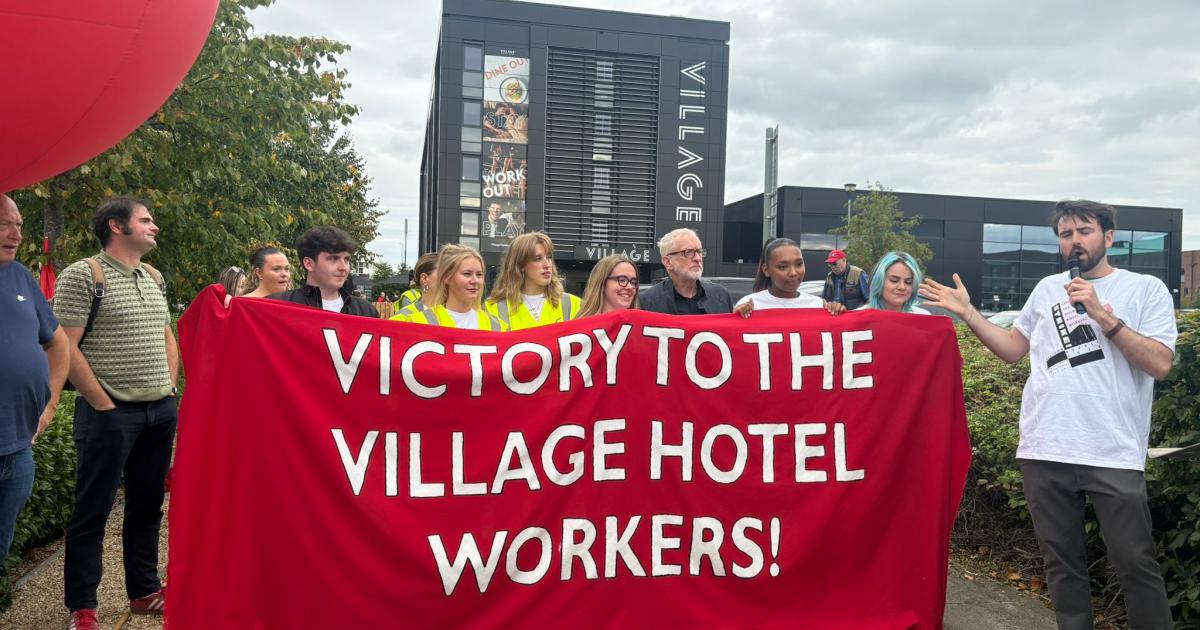The importance of this setting wasn’t lost on the host, who introduced Mr Corbyn saying: “there used to be ship yards dotted along the Clyde. Instead, it’s now hotels and bars.”
Hospitality workers at the Village Hotel have been engaged in a dispute lasting several weeks with the hotel management over pay discrepancies and working conditions. Mr Corbyn is in Scotland, but as the saying goes: the working man has no country, and at an event like in a political throwback to the seventies, he is on home ground.
But like the revolution in Britain’s economy which has defined this part of Glasgow, perhaps the political winds have changed for the former Labour leader.
Read more:
For someone who could once easily rally the masses in their tens of thousands a decade ago while Corbynism was in the ascendancy, the crowd in Glasgow is surprisingly thin and tinged by that other spectre of left wing movements: ideological fragmentation.
I spot three prominent members of the Scottish Greens’ radical cohort who recently caused a stir in the party after launching an ultimately unsuccessful challenge to Patrick Harvie’s place at the top of the party’s list for Greater Glasgow.
Amongst the crowd, I also noticed Alison Thewliss, the former SNP MP who lost her seat in Glasgow to Labour during the last election. I ask her if she thinks her own party should be worried about an insurgent left coalition led by Mr Corbyn. She’s tight-lipped, but questions whether the party can make much of an impact with “very little infrastructure on the ground.”
So where does Mr Corbyn and Zarah Sultana’s new party stand in Scotland?
“Your party dot UK” as Mr Corbyn refers to it, has been widely ridiculed online and in the press for a rocky start. Leaked internal squabbles, a confusing name, and a perceived lack of executive control, makes it appear to many as unserious and destined to be unsuccessful. Not an unwarranted assumption considering the political history of its Co-Leader.
But putting that aside, from estimating the average age two-hundred or so people gathered to see Mr Corbyn speak, it’s evident that the party would live and die with the youth vote.
At 19-years-old, one of the strike organisers, Stella, says that she finds Mr Corbyn’s new party’s platform “really inspiring.”
“It’s not like anything I’ve seen in politics recently,” she tells me. “I think if there was a way of collaborating, at least in some form with the Green Party so that it doesn’t split the left-wing vote too much, that would be brilliant.”
But like many people I speak to, she’s reluctant to commit to voting for them, as she fears that the voting makeup of her contingency could mean that the party amounts to a “wasted vote”.
Although another attendee, 30-year-old Ryan, tells me he’s ready to “put his full weight behind the party” as he sees it as a vehicle to “push back against Reform UK”.
Mr Corbyn and Ms Sultana are due to visit Glasgow together next month to launch their party’s first Scottish branch (Image: Leon Neal)The crowd pulsates in applause as Mr Corbyn can be seen approaching the picket. He speaks for fewer than ten minutes, but his audience are pleased, grinning, cheering – a member of the rival established Socialist Worker’s Party tells me he felt enlivened by the speech.
Mr Corbyn closes with a call to join his party which, he says, is “an organisation rooted in working class communities to bring about social change and social justice.”
News broke today that Mr Corbyn will be returning to Glasgow next month alongside Ms Sultana to launch the party’s first Scottish branch.
Perhaps the socialist duo with a properly marketed event could tap into a greater swathe of voters in Scotland beyond those who are drawn to a picket line.
The issues of Gaza and immigration are quickly becoming a stark dividing line in politics which would see some of the establishment parties firmly divided, with Mr Corbyn able to sweep up support.
Nonetheless, without a coherent platform and with virtually no left-wing independent representation in Holyrood, it’s clear making an impact in Scotland is going to be an uphill battle.
